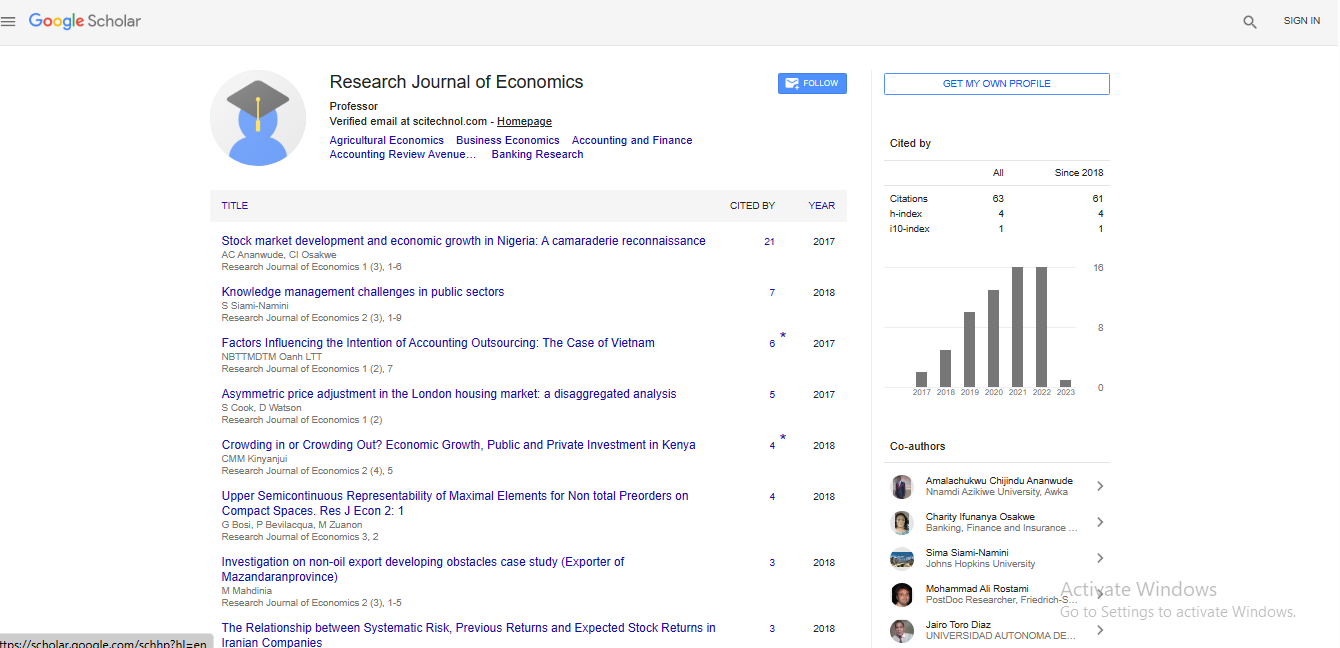Perspective, Res J Econ Vol: 5 Issue: 1
Monetary education of arrangement abilities
Dimitris
Department of Economics, Iowa State University, United States
Abstract
Monetary education is the ownership of the arrangement of abilities and information that permits a person to settle on educated and compelling choices with the entirety of their monetary assets. Bringing interest up in individual accounting is presently a focal point of state-run programs in nations including Australia, Canada, Japan, the United States, and the United Kingdom. Understanding essential monetary ideas permits individuals to realize how to explore in the monetary framework. Individuals with suitable monetary education preparing make better monetary choices and oversee cash in a way that is better than those without such preparing. The Organization for Economic Co-activity and Development (OECD) began a between legislative undertaking in 2003 with the goal of giving approaches to improve monetary instruction and education norms through the advancement of basic monetary proficiency standards. In March 2008, the OECD dispatched the International Gateway for Financial Education, which expects to fill in as a clearinghouse for monetary instruction projects, data and examination around the world. In the UK, the elective term "monetary ability" is utilized by the state and its offices: the Financial Services Authority (FSA) in the UK began a public procedure on monetary capacity in 2003. The US government set up its Financial Literacy and Education Commission in 2003.
Keywords: Monetary
Introduction
Monetary education is the ownership of the arrangement of abilities and information that permits a person to settle on educated and compelling choices with the entirety of their monetary assets. Bringing interest up in individual accounting is presently a focal point of staterun programs in nations including Australia, Canada, Japan, the United States, and the United Kingdom. Understanding essential monetary ideas permits individuals to realize how to explore in the monetary framework. Individuals with suitable monetary education preparing make better monetary choices and oversee cash in a way that is better than those without such preparing. The Organization for Economic Coactivity and Development (OECD) began a between legislative undertaking in 2003 with the goal of giving approaches to improve monetary instruction and education norms through the advancement of basic monetary proficiency standards. In March 2008, the OECD dispatched the International Gateway for Financial Education, which expects to fill in as a clearinghouse for monetary instruction projects, data and examination around the world. In the UK, the elective term "monetary ability" is utilized by the state and its offices: the Financial Services Authority (FSA) in the UK began a public procedure on monetary capacity in 2003. The US government set up its Financial Literacy and Education Commission in 2003. However it is empowering that the couple of monetary instruction programs which have been assessed have been discovered to be sensibly viable. Examination in the US shows that laborers increment their cooperation in 401(k) plans (a sort of retirement plan, with exceptional duty preferences, which permits workers to save and contribute for their own retirement) when bosses offer monetary schooling programs, regardless of whether as pamphlets or workshops. Notwithstanding, scholastic investigations of monetary schooling have discovered no proof of quantifiable accomplishment at improving members' monetary prosperity. As per 2014 Asian Development Bank review, more Mongolians have extended their monetary choices, and for example currently look at the financing costs of advances and investment funds administrations through the effective dispatch of the TV dramatization with center around the monetary proficiency of poor and non-helpless families. Given that 80% of Mongolians refered to TV as their primary wellspring of data, TV sequential shows were recognized as the best vehicle for messages on monetary education. The Australian Government set up a National Consumer and Financial Literacy Taskforce in 2004, which suggested the foundation of the Financial Literacy Foundation in 2005. In 2008, the elements of the Foundation were moved to the Australian Securities and Investments Commission (ASIC).
 Spanish
Spanish  Chinese
Chinese  Russian
Russian  German
German  French
French  Japanese
Japanese  Portuguese
Portuguese  Hindi
Hindi 